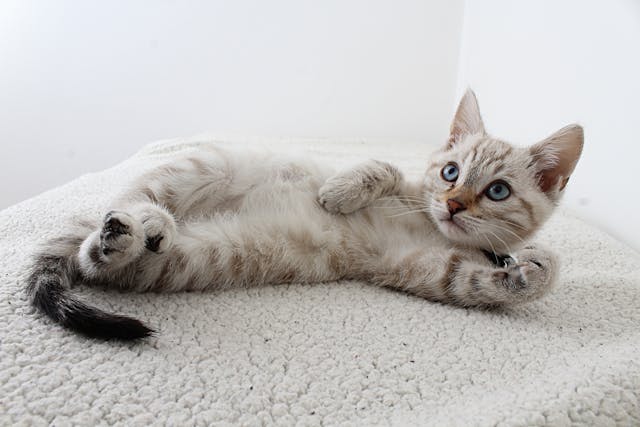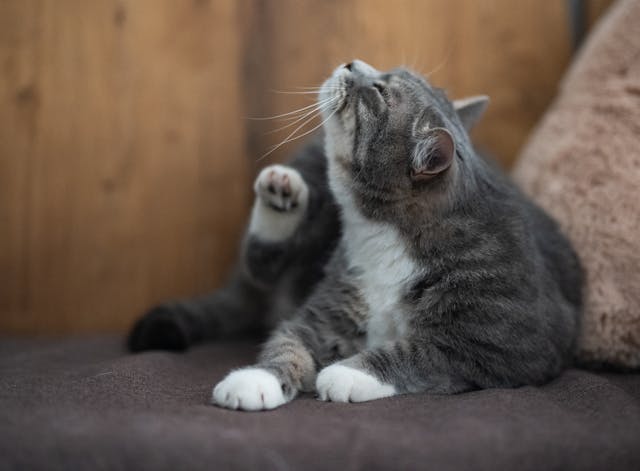Cats are often hailed as natural hunters and rodent deterrents, with many people believing that feline companions can keep rats at bay. But is this popular belief true, or is it just another urban legend?
In this article, we’ll explore the question: Do cats scare rats away? We’ll examine how effective cats are as rat deterrents and uncover whether your feline friend can truly help control rat populations.
The Myth of Cats and Rodent Control
So, the big question is: Do cats scare rats away?
The idea that cats naturally scare away rats has been around for ages and passed down through stories and beliefs. Cats were historically celebrated for keeping rodent populations in check, whether on farms, ships, or cities. But is there any truth to this long-standing belief? Let’s take a closer look.
Some cats are born hunters, while others couldn’t care less about chasing rodents. Plus, a well-fed cat may not feel the need to pursue other food if their bowl is always full.
Rats are no slouches, either. They’re intelligent critters that quickly adapt to their surroundings. They may become cautious and learn to avoid areas frequented by feline predators. Also, rats are mainly active at night, when cats might be more interested in sleeping than hunting.
While some accounts suggest cats can help control rat populations, others show little to no impact. Factors like the size of the rat population, food availability, and environmental conditions all seem to play a role in how effective cats are at keeping rats at bay.
In short, while cats have the instinct to hunt, the idea that they’re unbeatable rat deterrents is a bit exaggerated. Cats may play a role in managing rat populations in certain situations, but they’re not a one-size-fits-all solution.
Do Cats Scare Rats Away Well Enough?
While we know cats aren’t always certified rat hunters, can they stop an infestation before it begins? Let’s take a look at certain factors that may make your feline friend better at controlling rodents.
Breed and Individual Temperament
Cats come in many breeds, each with its own characteristics and hunting instincts. Some breeds, like Siamese or Maine Coon cats, are known for their hunting prowess, while others may be less inclined to hunt.
Individual temperament plays a significant role, too. Some cats may have a strong prey drive and actively seek out rodents, while others may be more laid-back and uninterested in hunting.
As cats age, their hunting skills may improve through experience and practice. Older cats may have honed their hunting techniques and be more effective at catching rodents.
Health and Fitness
A cat’s overall health and fitness level can impact its ability to hunt effectively. Cats that are overweight, injured, or suffering from health issues may be less motivated or physically unable to hunt. Conversely, healthy and active cats are more likely to engage in hunting behavior.

Feeding and Lifestyle
Cats that are well-fed and provided with regular meals may be less motivated to hunt for food, including rodents. Indoor cats that lack exposure to outdoor environments may also have limited opportunities to encounter rats. Conversely, outdoor cats with access to hunting grounds may be more likely to engage in predatory behavior.
Environmental Factors
Alternative food sources, like garbage bins or bird feeders, can influence a cat’s hunting behavior. Cats may prioritize easier-to-catch prey or food sources that require less effort. Environmental factors like weather conditions and time of day can impact a cat’s hunting activity.
Final Considerations and What You Should Use for Pest Control
Cats have long been considered natural predators of rodents like rats, but their effectiveness in controlling rat populations has benefits and drawbacks. Let’s explore these in more detail:
Potential Benefits
Natural Predators: Cats are instinctive hunters with sharp claws and keen senses, making them well-equipped to catch and kill rats.
Rodent Deterrent: The presence of a cat, even if it doesn’t actively hunt, may deter rats from entering a property or dwelling due to the perceived threat.
Low Maintenance: Once acclimated to an environment, cats require minimal maintenance for rat control compared to other pest control methods.
Potential Disadvantages
Inconsistent Results: Cats may not consistently hunt or catch rats, depending on factors such as breed, age, health, and individual temperament.
Selective Prey: Cats may prefer hunting smaller prey, such as birds or insects, over larger rodents.
Zoonotic Diseases: Cats that hunt and consume rodents may be at risk of contracting zoonotic diseases that rats carry, like leptospirosis or toxoplasmosis, which can pose health risks to cats and humans.
Dependency on Cat Behavior: Relying solely on cats for rat control requires confidence in their hunting abilities, which may not always align with their expectations or needs.

Professional Pest Control in Vancouver and Portland
For proven results, trust the experts! Our approach will send rodents packing, and our continued monitoring will keep them away. Contact us today for rodent control in Vancouver, Washington, and Portland, Oregon!



